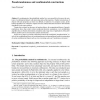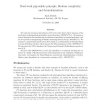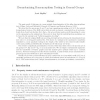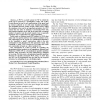16 search results - page 2 / 4 » On Derandomizing Probabilistic Sublinear-Time Algorithms |
CORR
2006
Springer
13 years 4 months ago
2006
Springer
Abstract. In combinatorics, the probabilistic method is a very powerful tool to prove the existence of combinatorial objects with interesting and useful properties. Explicit constr...
APAL
2004
13 years 4 months ago
2004
We study the extension (introduced as BT in [5]) of the theory S1 2 by instances of the dual (onto) weak pigeonhole principle for p-time functions, dWPHP(PV )x x2 . We propose a n...
STOC
2004
ACM
14 years 5 months ago
2004
ACM
The main result of this paper is a near-optimal derandomization of the affine homomorphism test of Blum, Luby and Rubinfeld (Journal of Computer and System Sciences, 1993). We sho...
FOCS
1999
IEEE
13 years 9 months ago
1999
IEEE
Various efforts ([?, ?, ?]) have been made in recent years to derandomize probabilistic algorithms using the complexity theoretic assumption that there exists a problem in E = dti...
COCO
2010
Springer
13 years 8 months ago
2010
Springer
A PCP is a proof system for NP in which the proof can be checked by a probabilistic verifier. The verifier is only allowed to read a very small portion of the proof, and in return ...




